By Arthur Bradley · Wednesday, April 1, 2020 Arthur Bradley’s “Terrors of Theory: Critical Theory of Terror from Kojève to Žižek” appears in Telos 190 (Spring 2020): Economy and Ecology: Reconceiving the Human Relationship to Nature. Read the full article at the Telos Online website, or purchase a print copy of the issue in our online store. Individual subscriptions to Telos are available in both print and online formats.
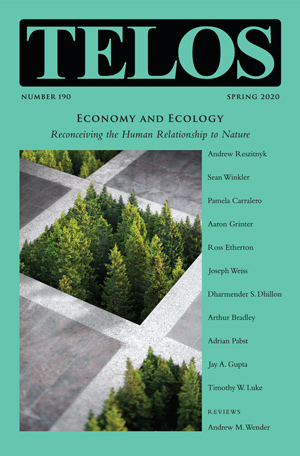 This essay seeks to offer a new genealogy of contemporary critical theory of terror from Alexandre Kojève to Slavoj Žižek. It is clear that critical theory’s response to the volatile post-9/11 geopolitical landscape takes many forms, but one of its most controversial tasks has been a reclamation of the fatal signifier “terror” itself for the radical Left. According to thinkers such as Žižek and Alain Badiou, we must redeem the emancipatory core of the Jacobin Terror from its “Thermodorean” betrayal by two centuries of political and economic liberalism. Yet my claim is that this critical attempt to recuperate terrorism can only be understood in the context of a much longer debate about the meaning of “terror” within twentieth-century European philosophy, which stretches back to Kojève’s lectures on Hegel in the 1930s. This essay tracks the evolution of critical theory of terror from Kojève’s political ontology of terror in his (famously or notoriously) idiosyncratic interpretation of the Hegelian master–slave dialectic to its contemporary conclusion in Žižek’s embrace of Jacobin terror. If Kojève’s lectures effectively introduced Hegel into twentieth-century European philosophy, I will argue that they were also the platform for a wave of neo-Hegelian reflections on the historical, political, and philosophical stakes of terror including, most importantly, Emmanuel Lévinas’s Time and the Other (1947) and Maurice Blanchot’s “Literature and the Right to Death” (1949). In conclusion, I contend that Žižek’s neo-Hegelian defense of the Jacobin leader Robespierre in recent works like In Defense of Lost Causes (2008) might, for better or worse, be read as the latest manifestation of this Kojèvean terrorist legacy. This essay seeks to offer a new genealogy of contemporary critical theory of terror from Alexandre Kojève to Slavoj Žižek. It is clear that critical theory’s response to the volatile post-9/11 geopolitical landscape takes many forms, but one of its most controversial tasks has been a reclamation of the fatal signifier “terror” itself for the radical Left. According to thinkers such as Žižek and Alain Badiou, we must redeem the emancipatory core of the Jacobin Terror from its “Thermodorean” betrayal by two centuries of political and economic liberalism. Yet my claim is that this critical attempt to recuperate terrorism can only be understood in the context of a much longer debate about the meaning of “terror” within twentieth-century European philosophy, which stretches back to Kojève’s lectures on Hegel in the 1930s. This essay tracks the evolution of critical theory of terror from Kojève’s political ontology of terror in his (famously or notoriously) idiosyncratic interpretation of the Hegelian master–slave dialectic to its contemporary conclusion in Žižek’s embrace of Jacobin terror. If Kojève’s lectures effectively introduced Hegel into twentieth-century European philosophy, I will argue that they were also the platform for a wave of neo-Hegelian reflections on the historical, political, and philosophical stakes of terror including, most importantly, Emmanuel Lévinas’s Time and the Other (1947) and Maurice Blanchot’s “Literature and the Right to Death” (1949). In conclusion, I contend that Žižek’s neo-Hegelian defense of the Jacobin leader Robespierre in recent works like In Defense of Lost Causes (2008) might, for better or worse, be read as the latest manifestation of this Kojèvean terrorist legacy.
Continue reading →
By David Pan · Monday, March 16, 2020 Telos 190 (Spring 2020): Economy and Ecology: Reconceiving the Human Relationship to Nature is now available for purchase in our store. Individual subscriptions to Telos are also available in both print and online formats.
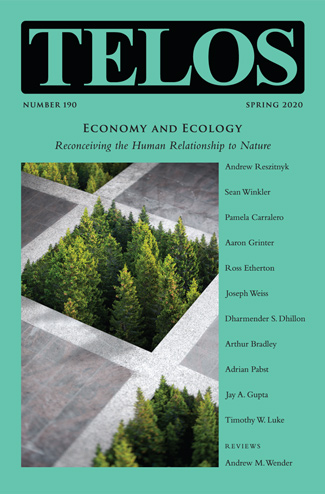 Our human relationship to nature defines our economic life. As Marx articulated in the 1844 manuscripts, labor involves an engagement with nature in order to fulfill human ends, the working up of nature as an “inorganic body.” Consequently, the world of work and that of the environment are really two aspects of our relationship to nature, and the shift in academic interest from economy to ecology as the burning issue of the day does not represent any real change in perspective. On a fundamental level, economy is ecology and vice versa. Thus, the issue of climate change is primarily one about the energy structure of our economy. If that structure before the Industrial Revolution boiled down to the way in which we were cutting down our forests, today the issue is how fossil fuels are leading to climate change. The other global natural disaster of our day, the coronavirus, has arisen as a consequence, first, of our treatment of wild animals as food and, second, of economic globalization, whose movements have established the pathways for the rapid spread of viruses. Our human relationship to nature defines our economic life. As Marx articulated in the 1844 manuscripts, labor involves an engagement with nature in order to fulfill human ends, the working up of nature as an “inorganic body.” Consequently, the world of work and that of the environment are really two aspects of our relationship to nature, and the shift in academic interest from economy to ecology as the burning issue of the day does not represent any real change in perspective. On a fundamental level, economy is ecology and vice versa. Thus, the issue of climate change is primarily one about the energy structure of our economy. If that structure before the Industrial Revolution boiled down to the way in which we were cutting down our forests, today the issue is how fossil fuels are leading to climate change. The other global natural disaster of our day, the coronavirus, has arisen as a consequence, first, of our treatment of wild animals as food and, second, of economic globalization, whose movements have established the pathways for the rapid spread of viruses.
Continue reading →
By Xudong Zhang and David Pan · Monday, December 16, 2019 Telos 189 (Winter 2019), a special issue on Constitutional Theory as Cultural Problem, edited by Xudong Zhang and David Pan, is now available for purchase in our store. Individual subscriptions to Telos are also available in both print and online formats.
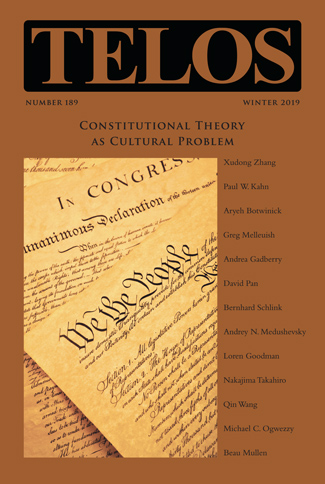 The challenges faced by the liberal democratic model of government in the twenty-first century have made constitutional theory into an urgent topic of global concern. Both the second Iraq war and the revolutions of the Arab Spring frustrated hopes of an easy global trajectory toward liberal democracy. If there was the hope that liberation would mean the establishment of liberal constitutional norms, the result has been that emancipation from tyranny does not naturally lead in a particular political direction. Meanwhile, established liberal democracies, from the United States to Europe to India, are facing upheavals that have prompted many to question the stability of the model itself, leading to the need to revise a constitutional theory that up to now has been built around the liberal democratic model. While the constitutional state, as theory and practice in modern Europe, North America, and Asia, continues to be the common point of reference, its stability and legitimacy can no longer be taken for granted, thus requiring renewed thinking about its history and cultural foundations. The challenges faced by the liberal democratic model of government in the twenty-first century have made constitutional theory into an urgent topic of global concern. Both the second Iraq war and the revolutions of the Arab Spring frustrated hopes of an easy global trajectory toward liberal democracy. If there was the hope that liberation would mean the establishment of liberal constitutional norms, the result has been that emancipation from tyranny does not naturally lead in a particular political direction. Meanwhile, established liberal democracies, from the United States to Europe to India, are facing upheavals that have prompted many to question the stability of the model itself, leading to the need to revise a constitutional theory that up to now has been built around the liberal democratic model. While the constitutional state, as theory and practice in modern Europe, North America, and Asia, continues to be the common point of reference, its stability and legitimacy can no longer be taken for granted, thus requiring renewed thinking about its history and cultural foundations.
Continue reading →
By Telos Press · Monday, December 9, 2019 New from Telos Press: Anthropocene Alerts: Critical Theory of the Contemporary as Ecocritique, by Timothy W. Luke. Order your copy in our online store, and save 20% on the list price by using the coupon code BOOKS20 during the checkout process.
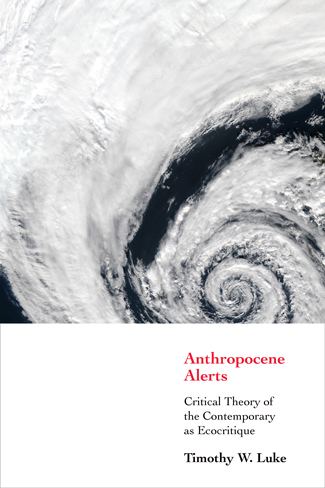 From the late 1970s, Timothy W. Luke has developed critical analyses of significant social, political, and cultural conflicts, with a particular focus on the entangled politics of culture, economy, and nature. Luke’s “ecocritiques,” many of which first appeared in the pages of Telos, advance a critical theory of the contemporary that takes aim at our ongoing ecological crisis, a period marked by rapid climate change, extensive biodiversity loss, and deep ecospheric damage. The essays collected here range across diverse topics, from the politics of the Anthropocene, Paolo Soleri’s urban design experiments, the Unabomber manifesto, the Trump administration’s attacks on environmental protections, and the informationalization of ecological change, to community agriculture projects, deep ecology, the symbolic politics of climate change treaties, Edward Abbey’s ecological writings, and the biopolitics of accelerationism and the Dark Enlightenment. Taken together, this collection documents crucial moments in Luke’s project of ecocritique as well as the commitment of Telos to environmental criticism, political theory, and policy analysis. From the late 1970s, Timothy W. Luke has developed critical analyses of significant social, political, and cultural conflicts, with a particular focus on the entangled politics of culture, economy, and nature. Luke’s “ecocritiques,” many of which first appeared in the pages of Telos, advance a critical theory of the contemporary that takes aim at our ongoing ecological crisis, a period marked by rapid climate change, extensive biodiversity loss, and deep ecospheric damage. The essays collected here range across diverse topics, from the politics of the Anthropocene, Paolo Soleri’s urban design experiments, the Unabomber manifesto, the Trump administration’s attacks on environmental protections, and the informationalization of ecological change, to community agriculture projects, deep ecology, the symbolic politics of climate change treaties, Edward Abbey’s ecological writings, and the biopolitics of accelerationism and the Dark Enlightenment. Taken together, this collection documents crucial moments in Luke’s project of ecocritique as well as the commitment of Telos to environmental criticism, political theory, and policy analysis.
Continue reading →
By Lillian Hingley · Thursday, September 19, 2019 As an occasional feature on TELOSscope, we highlight a past Telos article whose critical insights continue to illuminate our thinking and challenge our assumptions. Today, Lillian Hingley looks at Shannon Mariotti’s “Damaged Life as Exuberant Vitality in America: Adorno, Alienation, and the Psychic Economy” from Telos 149 (Winter 2009).
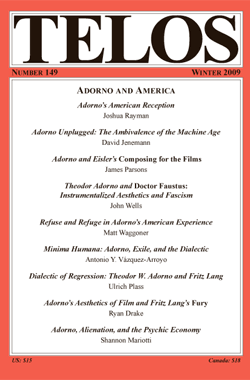 In her article “Damaged Life as Exuberant Vitality in America: Adorno, Alienation, and the Psychic Economy,” from Telos 149 (Winter 2009), Shannon Mariotti claims that Adorno’s Minima Moralia ultimately rejects psychoanalysis for reinforcing the reification that it was supposed to resist. She argues that Adorno is particularly concerned with an American psychodynamic therapy that empties psychoanalysis of its European “pessimism” and that instead seeks “happiness” rather than a mere “cure.” While some points in Mariotti’s argument and a more critical psychoanalysis are not incompatible, her cautious application of Adorno’s critique of psychoanalysis to a contemporary context suggests that Minima Moralia might provide a useful framework for interpreting modern American pharmaceutical psychology. In turn, this brief analysis adds context to Mariotti’s grant of practical space to mental illness in therapy rather than seeing it as something to be merely glossed over. Indeed, she gives today’s readers a blueprint for carefully applying Adorno’s thinking to contemporary American therapeutic practices. In her article “Damaged Life as Exuberant Vitality in America: Adorno, Alienation, and the Psychic Economy,” from Telos 149 (Winter 2009), Shannon Mariotti claims that Adorno’s Minima Moralia ultimately rejects psychoanalysis for reinforcing the reification that it was supposed to resist. She argues that Adorno is particularly concerned with an American psychodynamic therapy that empties psychoanalysis of its European “pessimism” and that instead seeks “happiness” rather than a mere “cure.” While some points in Mariotti’s argument and a more critical psychoanalysis are not incompatible, her cautious application of Adorno’s critique of psychoanalysis to a contemporary context suggests that Minima Moralia might provide a useful framework for interpreting modern American pharmaceutical psychology. In turn, this brief analysis adds context to Mariotti’s grant of practical space to mental illness in therapy rather than seeing it as something to be merely glossed over. Indeed, she gives today’s readers a blueprint for carefully applying Adorno’s thinking to contemporary American therapeutic practices.
Continue reading →
By Loralea Michaelis · Monday, February 25, 2019 Loralea Michaelis’s “Temporality and Revolution in Horkheimer’s Early Critical Theory: A Luxemburgian Reading of Dämmerung” appears in Telos 185 (Winter 2018). Read the full article at the Telos Online website, or purchase a print copy of the issue in our online store. Individual subscriptions to Telos are available in both print and online formats.
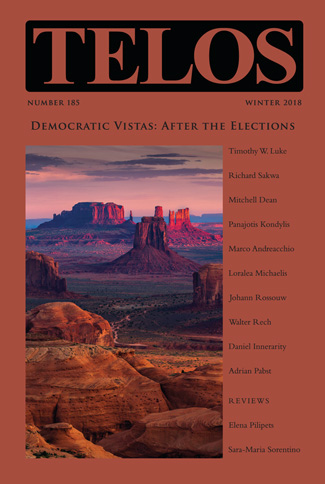 This article challenges the related assumptions about temporality and the significance of success and failure for revolutionary activism that have governed the standard interpretation of Horkheimer’s critical theory as foundering on the disappointment of its early revolutionary expectations. The early influence of Luxemburg on Horkheimer is used to bring into clearer focus Horkheimer’s handling of the problem of a failed revolution in Dämmerung, his earliest published work, which bears a striking resemblance to Luxemburg’s own positions on the centrality of failure to the development of the revolution as well as her critique of the success-oriented politics of reformism. Dämmerung foregrounds the German revolution of 1919–23, but the working through of its failure yields not pessimism over the future but a challenge to the preoccupation with future prospects which underlies both pessimism and optimism; it also yields a conception of revolution as a present-oriented resistance that not only does not expect to succeed in its aims but regards the aim of success with a skeptical eye. Contrary to the standard reading, the failed revolution is not a problem for which Horkheimer’s early critical theory needs to find a solution; rather, it is its practical correlative. This article challenges the related assumptions about temporality and the significance of success and failure for revolutionary activism that have governed the standard interpretation of Horkheimer’s critical theory as foundering on the disappointment of its early revolutionary expectations. The early influence of Luxemburg on Horkheimer is used to bring into clearer focus Horkheimer’s handling of the problem of a failed revolution in Dämmerung, his earliest published work, which bears a striking resemblance to Luxemburg’s own positions on the centrality of failure to the development of the revolution as well as her critique of the success-oriented politics of reformism. Dämmerung foregrounds the German revolution of 1919–23, but the working through of its failure yields not pessimism over the future but a challenge to the preoccupation with future prospects which underlies both pessimism and optimism; it also yields a conception of revolution as a present-oriented resistance that not only does not expect to succeed in its aims but regards the aim of success with a skeptical eye. Contrary to the standard reading, the failed revolution is not a problem for which Horkheimer’s early critical theory needs to find a solution; rather, it is its practical correlative.
Continue reading →
|
|
 This essay seeks to offer a new genealogy of contemporary critical theory of terror from Alexandre Kojève to Slavoj Žižek. It is clear that critical theory’s response to the volatile post-9/11 geopolitical landscape takes many forms, but one of its most controversial tasks has been a reclamation of the fatal signifier “terror” itself for the radical Left. According to thinkers such as Žižek and Alain Badiou, we must redeem the emancipatory core of the Jacobin Terror from its “Thermodorean” betrayal by two centuries of political and economic liberalism. Yet my claim is that this critical attempt to recuperate terrorism can only be understood in the context of a much longer debate about the meaning of “terror” within twentieth-century European philosophy, which stretches back to Kojève’s lectures on Hegel in the 1930s. This essay tracks the evolution of critical theory of terror from Kojève’s political ontology of terror in his (famously or notoriously) idiosyncratic interpretation of the Hegelian master–slave dialectic to its contemporary conclusion in Žižek’s embrace of Jacobin terror. If Kojève’s lectures effectively introduced Hegel into twentieth-century European philosophy, I will argue that they were also the platform for a wave of neo-Hegelian reflections on the historical, political, and philosophical stakes of terror including, most importantly, Emmanuel Lévinas’s Time and the Other (1947) and Maurice Blanchot’s “Literature and the Right to Death” (1949). In conclusion, I contend that Žižek’s neo-Hegelian defense of the Jacobin leader Robespierre in recent works like In Defense of Lost Causes (2008) might, for better or worse, be read as the latest manifestation of this Kojèvean terrorist legacy.
This essay seeks to offer a new genealogy of contemporary critical theory of terror from Alexandre Kojève to Slavoj Žižek. It is clear that critical theory’s response to the volatile post-9/11 geopolitical landscape takes many forms, but one of its most controversial tasks has been a reclamation of the fatal signifier “terror” itself for the radical Left. According to thinkers such as Žižek and Alain Badiou, we must redeem the emancipatory core of the Jacobin Terror from its “Thermodorean” betrayal by two centuries of political and economic liberalism. Yet my claim is that this critical attempt to recuperate terrorism can only be understood in the context of a much longer debate about the meaning of “terror” within twentieth-century European philosophy, which stretches back to Kojève’s lectures on Hegel in the 1930s. This essay tracks the evolution of critical theory of terror from Kojève’s political ontology of terror in his (famously or notoriously) idiosyncratic interpretation of the Hegelian master–slave dialectic to its contemporary conclusion in Žižek’s embrace of Jacobin terror. If Kojève’s lectures effectively introduced Hegel into twentieth-century European philosophy, I will argue that they were also the platform for a wave of neo-Hegelian reflections on the historical, political, and philosophical stakes of terror including, most importantly, Emmanuel Lévinas’s Time and the Other (1947) and Maurice Blanchot’s “Literature and the Right to Death” (1949). In conclusion, I contend that Žižek’s neo-Hegelian defense of the Jacobin leader Robespierre in recent works like In Defense of Lost Causes (2008) might, for better or worse, be read as the latest manifestation of this Kojèvean terrorist legacy. 






